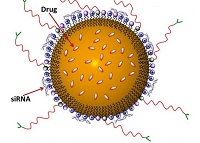 |
| Inhalable nanoparticles to be used as lung cancer treatment--Courtesy of Oregon State University |
U.S. researchers have developed a novel lung cancer treatment that uses nanoparticles to deliver an inhaled form of chemotherapy.
The scientists from Oregon State University, Rutgers University in New Jersey and the Cancer Institute of New Jersey developed "nanostructured lipid nanocarriers" that find cancer cells in the lung, attach to them and deliver drugs locally. With the inhaled substance, the patient receives an unadulterated form of the cancer drug compared with conventional intravenous administration, which can accumulate in other organs such as the liver or kidneys with toxic effects.
What's more, the nanoparticle comes with a bundle of small interfering RNA, siRNA, which helps silence certain genes to make the cancer cells more vulnerable to the drugs. Overall, the study showed 83% of the drug reaching its target in the lungs as opposed to 23% with the traditional approach, according to the article published in the Journal of Controlled Release.
"A drug delivery system that can be inhaled is a much more efficient approach, targeting just the cancer cells as much as possible," said co-author Oleh Taratula. "Other chemotherapeutic approaches only tend to suppress tumors, but this system appears to eliminate it."
The team has applied for a patent for the delivery platform, but human clinical trials will have to await further testing.
- here's the study from OSU (PDF)